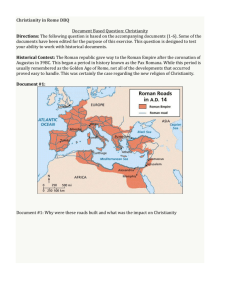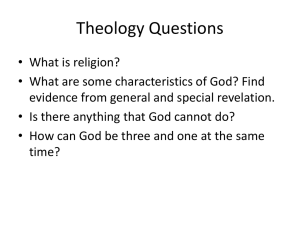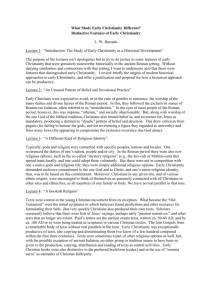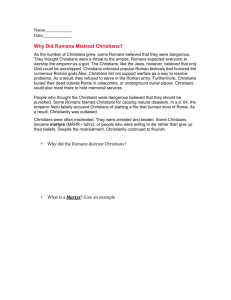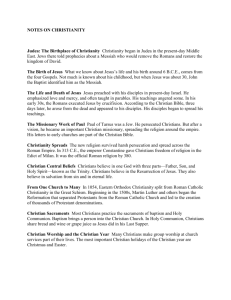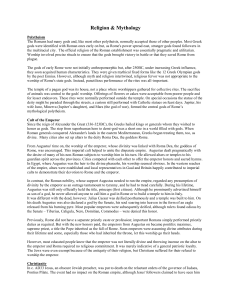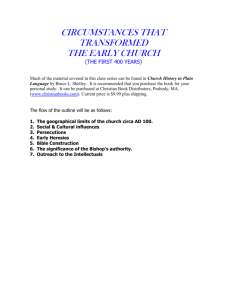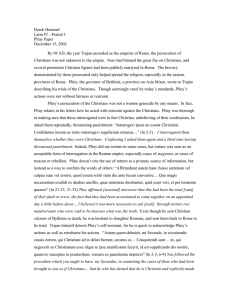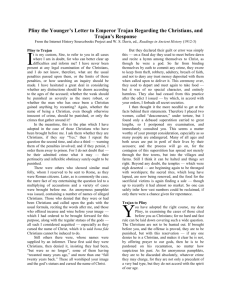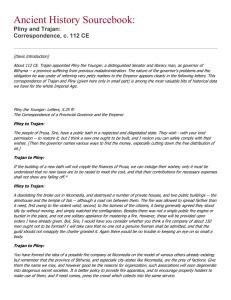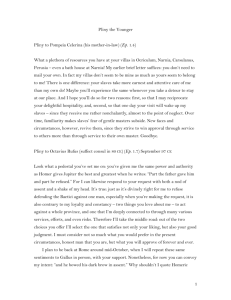What to do with Christians 112 AD ()
advertisement
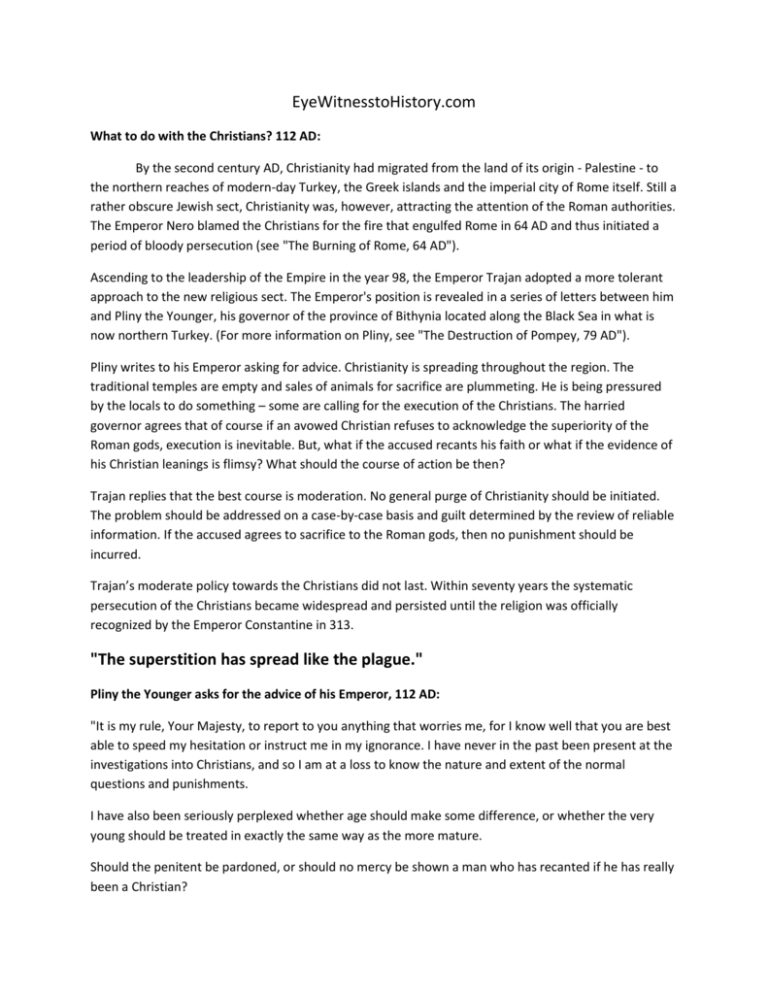
EyeWitnesstoHistory.com What to do with the Christians? 112 AD: By the second century AD, Christianity had migrated from the land of its origin - Palestine - to the northern reaches of modern-day Turkey, the Greek islands and the imperial city of Rome itself. Still a rather obscure Jewish sect, Christianity was, however, attracting the attention of the Roman authorities. The Emperor Nero blamed the Christians for the fire that engulfed Rome in 64 AD and thus initiated a period of bloody persecution (see "The Burning of Rome, 64 AD"). Ascending to the leadership of the Empire in the year 98, the Emperor Trajan adopted a more tolerant approach to the new religious sect. The Emperor's position is revealed in a series of letters between him and Pliny the Younger, his governor of the province of Bithynia located along the Black Sea in what is now northern Turkey. (For more information on Pliny, see "The Destruction of Pompey, 79 AD"). Pliny writes to his Emperor asking for advice. Christianity is spreading throughout the region. The traditional temples are empty and sales of animals for sacrifice are plummeting. He is being pressured by the locals to do something – some are calling for the execution of the Christians. The harried governor agrees that of course if an avowed Christian refuses to acknowledge the superiority of the Roman gods, execution is inevitable. But, what if the accused recants his faith or what if the evidence of his Christian leanings is flimsy? What should the course of action be then? Trajan replies that the best course is moderation. No general purge of Christianity should be initiated. The problem should be addressed on a case-by-case basis and guilt determined by the review of reliable information. If the accused agrees to sacrifice to the Roman gods, then no punishment should be incurred. Trajan’s moderate policy towards the Christians did not last. Within seventy years the systematic persecution of the Christians became widespread and persisted until the religion was officially recognized by the Emperor Constantine in 313. "The superstition has spread like the plague." Pliny the Younger asks for the advice of his Emperor, 112 AD: "It is my rule, Your Majesty, to report to you anything that worries me, for I know well that you are best able to speed my hesitation or instruct me in my ignorance. I have never in the past been present at the investigations into Christians, and so I am at a loss to know the nature and extent of the normal questions and punishments. I have also been seriously perplexed whether age should make some difference, or whether the very young should be treated in exactly the same way as the more mature. Should the penitent be pardoned, or should no mercy be shown a man who has recanted if he has really been a Christian? Should the mere name be reason enough for punishment however free from crime a man may be, or should only the sins and crimes that attend the name be punished? Till I hear from you, I have adopted the following course towards those who have been brought before me as Christians. First, I have asked them if they were Christians. If they confessed that they were, I repeated, my question a second and a third time, accompanying it with threats of punishment. If they still persisted in their statements, I ordered them to be taken out. For I was in no doubt that, whatever it was to which they were confessing, they had merited some punishment by their stubbornness and unbending obstinacy. There were others possessed by similar madness, but these I detailed to be sent to Rome, for they were Roman citizens. Soon, as I investigated the matter, types began to multiply as so often happens, and charges started to spread. An anonymous notebook was presented with many names in it. Those who denied that they were or ever had been Christians I thought should be released, provided that they called on the gods in my presence, and offered incense and wine to your statue (which I had expressly brought in with the images of the gods for that very purpose), and, above all, if they renounced Christ, which no true Christian, I am told, can be made to do. Others informed against admitted that they were Christians but later denied it; they had been, but had given up, some three years past, some further back and one person as long as 25 years ago. All of them reverenced your statue and the images of the gods, and renounced Christ. They stated that the sum total of their fault or error was as follows. On a fixed day they used to assemble before dawn to sing an antiphonal hymn to Christ as to a god, and to bind themselves by oath not for any criminal purpose, but to commit no fraud, no robbery or adultery, to bear no false witness, and not to deny any debt when asked to pay up. After this it was their custom to separate and to reassemble to eat a communion meal, all together and quite harmless. They claimed that they had stopped even that after my edict in which I followed your commands in banning society meetings. So I felt it all the more necessary to find out the truth under torture from two slave girls whom they called Deaconesses. But I found nothing but a depraved and groundless superstition. So I postponed my inquiry to consult you. The matter seemed worth your attention, especially since the number of those slipping is great. Many people of all ages and classes and of both sexes are now being enticed into mortal peril and will be in the future. The superstition has spread like the plague, not only in the cities but in the villages and the countryside as well. I feel it must be stopped and checked. It is true that everyone is agreed that temples once deserted are now being attended once again, and that sacred ceremonies once neglected are again being performed. Victims for sacrifice are everywhere on sale, for which only an odd buyer could be found a short while ago. All this goes to show how many men could be saved if there is room for repentance." The Emperor's Reply "You have acted quite properly, Pliny, in examining the cases of those Christians brought before you. Nothing definite can be laid down as a general rule. They should not be hunted out. If accusations are made and they are found guilty, they must be punished. But remember that a man may expect pardon from repentance if he denies that he is a Christian, and proves this to your satisfaction, that is by worshiping our gods, however much you may have suspected him in the past. Anonymous lists should have no part in any charge made. That is thoroughly bad practice and not in accordance with the spirit of the age." References: This eyewitness account appears in: Workman, B.K. (ed.), They saw it Happen in Classical Times (1964); McManners, John (ed.) The Oxford Illustrated History of Christianity (1990); Johnson, Paul, A history of Christianity (1976). How To Cite This Article: "What to do with the Christians? 112 AD" EyeWitness to History, www.eyewitnesstohistory.com (2008).
